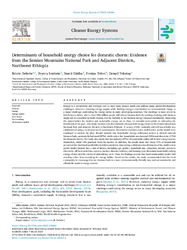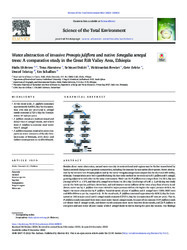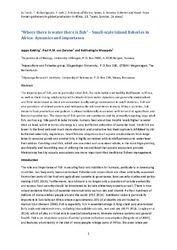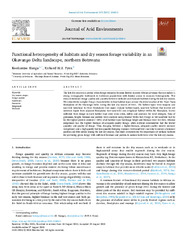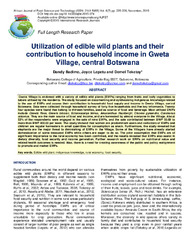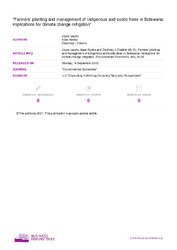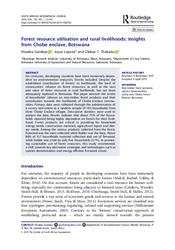Research articles: Recent submissions
Now showing items 21-40 of 88
-
Determinants of household energy choice for domestic chores: Evidence from the Semien Mountains National Park and Adjacent Districts, Northwest Ethiopia.
(Elsevier, 2023-04-04)Energy is a cornerstone and strategic tool to meet basic human needs and address many global development challenges. However, ensuring energy supply while limiting energy’s contribution to environmental change is a major ... -
Water abstraction of invasive Prosopis juliflora and native Senegalia senegal trees: A comparative study in the Great Rift Valley Area, Ethiopia
(Elservier, 2023)Besides direct water abstraction, natural water scarcity in semi-arid and arid regions may be further exacerbated by human-assisted changes in vegetation composition, including the invasion by non-native plant species. ... -
Agrotourism as peripheral and ultraperipheral community livelihoods diversification strategy: Insights from the Okavango Delta, Botswana
(Elservier, 2023)The potential of agrotourism for livelihoods diversification in remote (peripheral) and extremely remote (ultraperipheral) traditional, agrarian communities is indeed a testament of its uniqueness to enhance rural ... -
Extraction of Pesticides from Plants using Solid Phase Microextraction and QuEChERS
(South African Journal of Chemistry, 2013)A study employing dispersive solid phase extraction in the formof the quick, easy, cheap, effective, rugged and safe (QuEChERS) method and solid phase microextraction (SPME) for the cleanup of pesticides in plant samples ... -
Classical fisheries theory and inland (floodplain) fisheries management; is there need for a paradigm shift? lessons from the Okavango Delta, Botswana
(Fisheries and Aquaculture Journal, 2014-07-29)This paper reviews the fisheries management question of inland (floodplain) systems in the developing world and proposes a paradigm shift in approach. Inland fisheries management is largely based on classical fisheries ... -
Legal aspects of transboundary water management: An analysis of the intergovernmental institutional arrangements in the Okavango River Basin
(Cambridge University Press, 2020-01-10)The Okavango River Basin is a transboundary basin which serves as an important source of water resources for three riparian Southern African states, namely Angola, Botswana, and Namibia. If not properly managed, the Okavango ... -
Spatial and temporal variations of microinvertebrates across temporary floodplains of the lower Okavango Delta, Botswana
(Elservier, 2011-08-06)The connectivity of the Okavango Delta to its temporary floodplains may reduce due to threats of increasing human water demands and climate change. Microinvertebrates in aquatic systems have a regulatory effect on juvenile ... -
“Where there is water there is fish” – Small-scale inland fisheries in Africa: dynamics and importance
(2015)The importance of fish, and in particular small fish, for sustainable and healthy livelihoods in Africa, as well as their strong relationship with climate driven water dynamics are generally undervalued and little understood ... -
Environmental variability and the fishery dynamics of the Okavango delta, Botswana: the case of subsistence fishing
(Wiley, 2009-02-03)The hydrological regime of the Okavango River Basin is the main driver of ecological change in the delta. The delta supports a small-scale fishery which is a source of livelihood for communities within its fringes. The ... -
Indigenous knowledge, livelihoods and government policy in the Okavango Delta, Botswana
(Nova Science Publishers, 2011)Communities in and around the Okavango Delta are still highly dependent on natural resources, and indigenous knowledge pertaining to the use and management of these resources has helped sustain both people‟s livelihoods ... -
HIV/AIDS, artisanal fishing and food security in the Okavango Delta, Botswana
(Elservier, 2017)Generally, rural households pursue all year round natural and non-natural resource-based livelihood systems to diversify these options in order to cope with risks emanating from a range of shocks and stressors. Artisanal ... -
Livestock predation, household adaptation and compensation policy: a case study of Shorobe village in Northern Botswana
(Taylor and Francis Group, 2012)Human-wildlife conflict is a worldwide phenomenon. Through a household survey supplemented by informal interviews, this study attempts to understand the dynamics of livestock predation by carnivores at village level in ... -
Essential mineral content of common fish species in Chanoga, Okavango Delta, Botswana
(Academic Journals, 2015-09)Developing countries remain overwhelmed by nutritional problems caused mainly by poverty, natural disasters and political instabilities. The aim of this study was to determine essential mineral content of some common fish ... -
Food webs and energy fluxes on a seasonal floodplain: The influence of flood size
(SpringerLink, 2007)The world’s largest inland delta, located on the Okavango River in Botswana, faces major changes in the annual flooding size and duration due to climatic shifts and increased water use. We examined several parameters of a ... -
Natural resources assessment in the Okavango Delta, Botswana: Case studies of some key resources
(Wiley, 2005-02)This article makes an assessment of the following key natural resources in the Okavango Delta: arable land, basket-making resources, fish stocks, and river reeds. Non-data-intensive socio-economic indicators (as opposed ... -
Functional heterogeneity of habitats and dry season forage variability in an Okavango Delta landscape, northern Botswana.
(Elsevier, 2021-08-27)The late dry season is a period when forage resources become limited in some African savannas that can induce a strong demographic bottleneck in herbivore populations with limited access to resource heterogeneity. This ... -
Utilization of edible wild plants and their contribution to household income in Gweta Village, central Botswana.
(International Research Journals, 2015-11)Gweta Village is endowed with a variety of edible wild plants (EWPs) ranging from fruits and leafy vegetables to tubers utilised by the residents. The study focused on documenting and synthesising indigenous knowledge ... -
Farmers’ planting and management of indigenous and exotic trees in Botswana: implications for climate change mitigation.
(Business Perspectives [Commercial Publisher], 2015)Natural woodlands provide majority of rural population with energy source, food, building material and fodder for livestock. However, current developments and population growth have exerted enormous pressure on the woodlands ... -
Forest resource utilisation and rural livelihoods : insights from Chobe enclave, Botswana.
(Routledge Taylor & Francis Group, 2020-01-31)For centuries, developing countries have been immensely dependent on environmental resources, forests included. Despite the established contribution of forests to livelihoods, the level of communities’ reliance on forest ... -
Community-Based Natural Resource Management and Tourism Partnership in Botswana: Which Way Forward?
(The Botswana Society, 2008)This exploratory study uses two case studies of the Chobe Enclave Community Trust (CECT) in Chobe District and the Sankuyo Tshwaragano Management Trust (STMT) in the Okavango Delta area of Botswana to examine the ...

